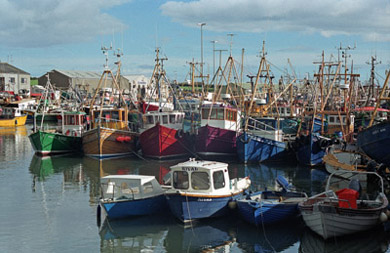A substantial fine imposed on a Northern Ireland trawler owner who fished illegally in Manx waters demonstrates how seriously such offences are viewed and how effective policing is by the Isle of Man fisheries authorities.
That is the message from Geoffrey Boot MHK, Minister for Environment, Food and Agriculture, after Christopher Heslip was fined £26,000 and ordered to pay court costs of £50.

Mr Heslip, of Mountain Road, Kilkeel, is licenced to fish in Manx waters in his vessel, Highland Queen, but breached licence conditions in August and September last year.
Electronic vessel monitoring data analysed by Department of Environment, Food and Agriculture officers highlighted the breaches, which were further investigated by enforcement officers.
Mr Heslip appeared before Deputy High Bailiff Jayne Hughes today and admitted an offence of exceeding queen scallop catch limits and fishing during curfew periods.
Catch limits and curfews are among measures imposed to aid the long term sustainability of the vulnerable and economically important fishery.
Mr Heslip said a plotter on board his vessel was broken so he had to rely on less reliable radar to chart his position and thought he was outside the Island’s 12-mile limit.
Imposing the fine, the Deputy High Bailiff gave credit for Mr Heslip’s early guilty plea and his co-operation with DEFA officers.
However, Mr Heslip had committed a serious offence and, as an experienced fisherman, should have ceased to fish when he realised his plotter was broken, she stated.
The £26,000 penalty reflected the total value of the unlawful catch (£13,000) and Mr Heslip was fortunate to keep his licence and his vessel, which can be confiscated by law, the Deputy High Bailiff said.
Minister Boot said: ‘The queen scallop fishery is worth millions of pounds to the Island’s economy and supports hundreds of jobs. This skipper was one of very few eligible to fish this restricted fishery and he demonstrated blatant disregard for the Island’s conservation measures.
“My Department employs a range of management measures to support the long term sustainability of stocks, which have been in decline.
“We police our waters vigilantly and do not hesitate to apprehend those breaking the law.
“I hope this prosecution and the size of the fine tells fishermen how seriously the Island views breaches of the law.”
The maximum fine for such offences under the Fisheries Act 2012 is £50,000.

























